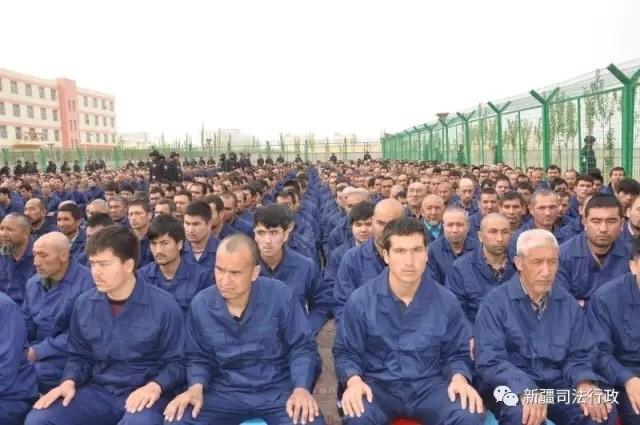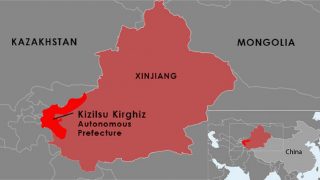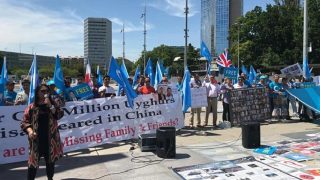
China’s tightening curbs on media and speech freedoms compound the hardships of Uyghurs in the Xinjiang Uyghur Autonomous Region (XUAR), where authorities stop at nothing to prevent reporting on the close to two million people who have disappeared into internment camps, Uyghur and press advocates said.
World Press Freedom Day on May 3 has brought fresh global scrutiny of China’s record as a top jailer of journalists and bloggers, its heavy censorship of media, and its extensive cyber surveillance methods. While harsh all across China, these restrictions are often more severe in ethnic regions like the XUAR and Tibet.
“China’s state and privately-owned media are now under the Communist Party’s close control while foreign reporters trying to work in China are encountering more and more obstacles in the field,” Paris-based Reporters Without Borders (RSF) said.
“More than 100 journalists and bloggers are currently detained in conditions that pose a threat to their lives,” added RSF. The group ranked China 177th out of 180 countries – above only Eritrea, Turkmenistan and North Korea – in an annual global press freedom index issued last month.
These are not abstract numbers to Uyghurs, says the Uyghur Human Rights Project, a Washington-based advocacy group.
“Reporting on conditions in East Turkistan has long been a red line for the Chinese government,” the UHRP said in a statement for World Press Freedom Day.
“However, conditions are becoming even more challenging,” the group said, noting the recent expulsions by China of a group of reports from reporters from the New York Times, Wall Street Journal and Washington Post.
“All three of these newspapers have published groundbreaking stories bringing to light critical facts about the crackdown in East Turkistan, including reports on forced labor, the high-tech police state, and the effect of internment camps on the region,” the UHRP said, using the Uyghurs’ name for the XUAR.
‘What are they trying to hide?’
Since April 2017, authorities in the XUAR are believed to have held up to 1.8 million Uyghurs and other Muslim minorities accused of harboring “strong religious views” and “politically incorrect” in some 1,300 internment camps throughout the region.
As reports of the camp system started to reach a global audience, China began describing the facilities as “boarding schools” that provide vocational training for Uyghurs, discourage radicalization, and help combat terrorism.
But reporting by RFA and other media outlets, drawing on testimonies from camp survivors and leaks of official documents, shows that those in the camps are detained against their will and subjected to political indoctrination, rough treatment, poor diets and unhygienic conditions in crowded facilities
“The Chinese government has been making it increasingly difficult to report from the region for years now — and now, it’s virtually impossible,” UHRP project manager Nicole Morgret told RFA’s Uyghur Service.
“The behavior of the CCP’s central and regional authorities is ample evidence that they are conducting a cover-up,” said UHRP Executive Director Omer Kanat in a statement on press freedom.
“As the Chinese government ramps up disinformation efforts in response to reporting on their human rights abuses in East Turkestan, international audiences should ask themselves, ‘What are they trying to hide?’”
A 2019 report by the Foreign Correspondents Club of China, based on a poll of members’ experiences the previous year found that journalists who travelled to the XUAR were followed, physically blocked from moving and pressured to delete their notes and photos.
“There is a risk that even foreign media will shy away from stories that are perceived as too troublesome, or costly, to tell in China,” then FCCC President Hanna Sahlberg said in the report.
Biggest jailer of journalists and bloggers
Also in the run up to World Press Freedom Day, Democratic Rep. James McGovern and U.S. Senator Marco Rubio, the Chair and Cochair, of the Congressional-Executive Commission on China (CECC), sent a letter to President Donald Trump expressing concern about draconian press controls in China.
“The many restrictions currently in effect limit not only what the world knows about China, but what the Chinese people know about their own government and its policies,” they wrote.
“There are more journalists and bloggers detained in China than anywhere else in the world,” the lawmakers said, appealing to Trump to press for the release of jailed writers and intellectuals, including two Uyghurs jailed for life for separatism.
“A disproportionate number of the journalists imprisoned in China are of a Uyghur background, and that number has only gone up during this most recent crackdown,” Morgret of the UHRP told RFA
McGovern and Rubio called for the release of Ilham Tohti, winner of the European Parliament’s 2019 Sakharov Prize for Freedom of Thought, who was sentenced to life in prison for “separatism” in 2014, despite having worked for decades to foster dialogue between Uyghurs and Han Chinese.
“My father was just practicing his fundamental rights,” Jewher Ilham, Tohti’s daughter, told RFA.
“Without free speech, how is it possible for people to gain understandings between each other? Without a free press, how do people learn the truth?”
Gulmira Imin, a Uyghur website administrator, who was jailed for life in 2019 on charges of “splittism, leaking state secrets, and organizing an illegal demonstration” and suffered torture in custody, should also be released, the lawmakers’ letter to Trump said.
The U.S. State Department’s annual human rights report for 2019, released in March, noted the arrest the previous year of the Xinjiang Daily deputy editor-in-chief Ilham Weli, directors Memtimin Obul and Juret Haji of that paper, and Mirkami Ablimit, the head of the Xinjiang Farmer’s Daily.
The journalists were all arrested for publishing “two-faced” articles in the newspaper’s Uyghur language section, the report said, adding the “two-faced” is “adopted by the Chinese authorities to accuse those who allegedly secretly oppose government policies.”
Reported by Nuriman Abdurashid and Alim Seytoff for RFA’s Uyghur Service. Written in English by Paul Eckert.
Source: Copyright © 1998-2016, RFA. Used with the permission of Radio Free Asia, 2025 M St. NW, Suite 300, Washington DC 20036. https://www.rfa.org.



